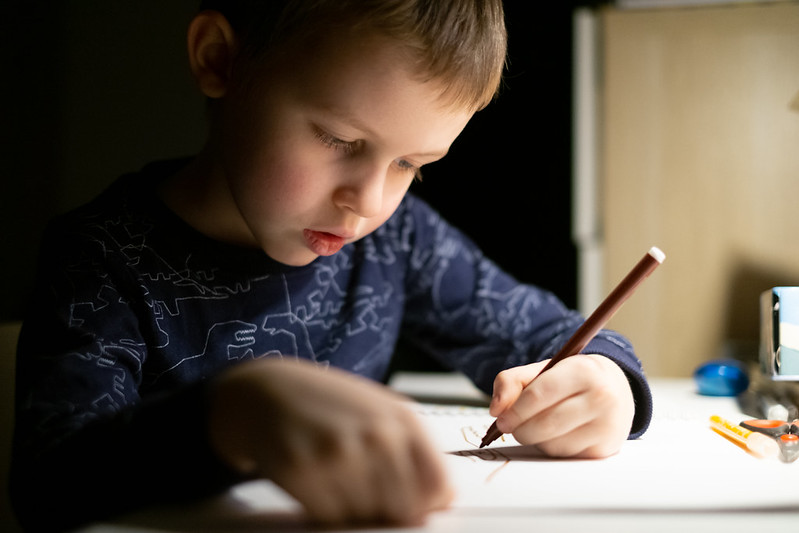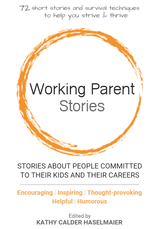|
Submitted by Kathy Haselmaier A number of recent activities have me thinking about an intersting way parents differ, even within tight groups. It seems that some parents encourage their children to try to "fit in" while others encourage them to try to be "different". Most parents want their kids to succeed, but they don't always appear to agree about which paths are most likely to lead to success. I'm thinking that in many cases, our work experiences influence our parenting philosophies. When in come to helping kids develop their identities, some parents appear to strongly encourage their kids to seek out a good group of friends and then find ways to "fit in". In some cases the parents even go to extraordinary lengths to ensure that their children will be accepted by a group by encouraging (or even pushing) them to pursue popular activities such as soccer, choir, or academics. Sometimes the parents go as far as purchasing expensive things like clothes, cars and trips to be sure that the kids "fit in". Then, once the kids are established within a group, the parents encourage them to try to stand-out among that group. Other parents appear to take a different approach. They don't appear to value the trending activities as much and instead encouage their kids to follow an inner calling and/or look for empty spaces to fill be pursuing less popular activities like fencing, origami, or cooking. These parents seem to think that their children are more likely to be successful in this way. Is one way better than the other? Well I certainly have a preference for one of those routes over the other, but maybe that's because it's the best path for my kids. The more I think about it, the more I think we need both kinds of people; those striving to seek commonalities as well as those who want to be different. If everyone was striving to fit in all of the time things could get very boring very quickly. And if everyone wanted to be different, maybe nobody would be different, and we'd devolve into a state of utter chaos. Which kind of parent are you?
0 Comments
Inspired by a New York Times article by Jessica Bennett What does your child's failure, large or small, imply about you? Many parents, those who pursue careers and those who don't, seem to fear that a child's failure will imply that they aren't parenting well. Think about that; some people think that a child's failure isn't healthy and even go to unusual extremes to help their children avoid failing. This topic caught our attention after reading an article in the New York Times called "On Campus, Failure Is on the Syllabus". It turns out that some students are so unfamiliar with failure that some colleges are offering courses to teach them how to do it. As a working parent, this topic caught me off-guard because failure was an integral part of daily life around our house. While I always produced clean clothes for everyone, they weren't always dry. Homework and lunches were occasionally forgotten. Planes were missed; twice. Test scores weren't always worthy of display on the refrigerator. Vacation activities sometimes proved to be ... not so fun. And managers didn't always heap on the praise. And yet ... we survived. Sometimes we even succeeded. Each of us learned, at least theoretically, that when something doesn't turn out the way you want, you keep on going, try harder next time, and often need to change your behavior to avoid experiencing even more failure in the future. Failure isn't a showstopper, but it is often a signal that change is needed. Many years ago a friend advised, "Let your kids fail on the little stuff when they are little so that they're not learning to deal with failure for the first time when they are older and the stakes are much higher." We took the advice to heart, but have to admit, even today, that watching anyone you care about fail is not easy. And it's not fun. Sometimes we failed when it came to teaching failure. "Good parents" let their kids fail; they don't swoop in, solve problems that children could solve for themselves, and then declare themselves the heroes in their family stories. Instead, they encourage children to resolve their own failures, and they allow their children to feel the satisfaction and experience the increased self-confidence that those failure experiences produce. They let their children become the heroes of their own stories, and they teach them that struggle can be valuable. They understand that parents should attempt to keep their children safe, but that most failures don't compromise safety. For all parents, and especially working parents, these realizations can be freeing. When we make room for failure, we spend less time doing and more time watching, supporting, and encouraging. As Retired USAF Colonel Gregory H. Johnson said at Michigan Tech's spring commencement ceremony recently, "Failure's not only an option, it's a requirement for succeeding in life." Related story:
As I mentioned in my recent Paris in the Springtime story, I vacationed alone in Paris last month. I landed back in Denver on a Friday evening, and in a mostly unplanned turn of events, my 23 year old son boarded the same plane and headed off to start his own solo travel adventure just a few hours later. I traveled alone in an attempt to add adventure to my life, and he traveled alone to visit friends he'd met when he studied in Sweden during his junior year of college. Since returning from my trip, people have said many interesting things to me including these comments from two very capable young women: "I wanted to do that, but my dad wouldn't let me" and "I could never do that!" These comments got me thinking. My experiences got me thinking too. The first thought is that, for me, traveling alone felt safer than traveling with others for the following reasons:
I'm so glad that my son had the opportunity to travel alone while he was living in Sweden, and I'm glad that he's willing to keep doing it now. Business travel is often a solo trip, so these experiences will only help him as he establishes his career. Experienced travelers are best able to focus on their job responsibilities when their work requires them to function away from their home base. If we want our daughters to be able to take advantage of opportunities to earn as much as our sons, we need to help prepare them for the work ... which often requires travel. It doesn't make sense to pay a person with less experience the same as a person with more experience. Instead of teaching our daughters to be fearful, let's teach them to be capable.
|
The StoriesArchives
March 2022
Categories
All
|
Photos from barnimages.com, marcoverch, truewonder, donnierayjones, marcoverch, shixart1985, Gustavo Devito, edenpictures, nan palmero, quapan, The Pumpkin Theory, bark, opassande, Semtrio, Ivan Radic (CC BY 2.0), verchmarco (CC BY 2.0), Didriks, shawnzrossi, shixart1985 (CC BY 2.0), madprime, marksmorton, CT Arzneimittel GmbH, NwongPR, franchiseopportunitiesphotos, anotherlunch.com, jdlasica, wuestenigel, Frinthy, romanboed, Doris Tichelaar, quinn.anya, A_Peach, VisitLakeland, MEDION Pressestelle, Darren Wilkinson, bratislavskysamospravnykraj, Anthony Quintano, Danielle Scott, pockethifi, Bridgette Rehg, Martin Pettitt, PersonalCreations.com, wuestenigel, Thad Zajdowicz, archer10 (Dennis) 139M Views, Infomastern, beltz6, The National Guard, futurestreet, daveynin, OIST (Okinawa Institute of Science and Technology), Rinet IT, shixart1985, mikecogh, JeepersMedia, Ryan Polei | www.ryanpolei.com, Jake.Christopher., aleksandrajovovich, thepeachpeddler, wwward0, flossyflotsam, Got Credit, Senado Federal, Corvair Owner, lookcatalog, moodboardphotography, dejankrsmanovic, Carine fel, ElleFlorio, {Guerrilla Futures | Jason Tester}, greg westfall., Arlington County, mariaronnaluna, quinn.anya, wuestenigel, Tayloright, insatiablemunch, MrJamesBaker, Scorius, Alan Light, Monkey Mash Button, www.audio-luci-store.it, wohlford, Vivian Chen [陳培雯], okchomeseller, BoldContent, Ivan Radic, verchmarco, donnierayjones, Czar Hey, US Department of Education, Andrew Milligan Sumo, Michel Curi, anotherlunch.com, ProFlowers.com, Cultural viewpoints from around the world, alubavin, yourbestdigs, Rod Waddington, Tayloright, Wonder woman0731, yourbestdigs, donald judge, Thomas Leth-Olsen, Infinity Studio, shixart1985, wuestenigel, francesbean, Roger Blackwell, MrJamesBaker, Luca Nebuloni, MFer Photography, erinw519, boellstiftung, North Carolina National Guard, A m o r e Caterina, MrJamesBaker, bellaellaboutique, Free For Commercial Use (FFC), Prayitno / Thank you for (12 millions +) view, wuestenigel, Matt From London, MadFishDigital, Kompentenzzentrum Frau und Beruf, mikecogh, CreditDebitPro, marciadotcom, Mr.Sai, _steffen







 RSS Feed
RSS Feed